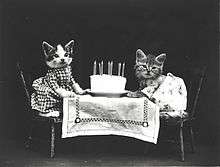Harry Whittier Frees
Harry Whittier Frees (1879–1953) was an American photographer who created novelty postcards, magazine spreads, and children's books based on his photographs of posed animals.[1] He dressed the animals and posed them in human situations with props, often with captions; these can be seen as progenitors of modern lolcats.[2][3]

On the choice of cats for his photos Frees states in his book Animal Land on the Air:
Rabbits are the easiest to photograph in costume, but incapable of taking many 'human' parts. Puppies are tractable when rightly understood, but the kitten is the most versatile animal actor, and possesses the greatest variety of appeal.[4]
He used 1/5th of a second exposures[2] and held the animals in position using stiff costuming, pins, and forks.[3] He worked three months out of the year, since making the images was stressful.[2]
Frees was born in Reading, Pennsylvania, in 1879, after which his family moved to Oaks, Pennsylvania. In 1937 he was working in Audubon, assisted by a housekeeper who made the animal costumes.[2] He remained single and spent much of his life caring for his parents; after they died he moved to Clearwater, Florida, where he committed suicide in 1953 after being diagnosed with cancer.[3]
References
- "Harry Whittier Frees (1879-1953)". One More River. Archived from the original on 2014-05-16. Retrieved 2014-05-15.
- "Speaking of Pictures These are Harry Frees's Lifework". Life Magazine. 1937-03-01. pp. 4–5.
- Nicholas Gilmore (2018-09-10). "The Cat Meme Photographer from a Century Ago". Saturday Evening Post. Retrieved 2018-09-23.
- "LOLcats: Pictures By Harry Whittier Frees Show Felines Subject Of Fun Even 100 Years Ago". Huffington Post UK. 2013-02-13. Retrieved 2014-05-15.
Further reading
- Cats, Dogs & Other Rabbits: The Extraordinary World of Harry Whittier Frees by Harry Whittier Frees and Sylvie Treille, Dewi Lewis Publishing, 2006.
- בר, ראם: "חיות בלבוש אדם ומסורות חזותיות בשירי אמא אווזה של הארי ויטייר פריס", עיונים בספרות ילדים 20 (תשע″א, 2011) עמ′ 55-16. This Hebrew article focuses on Frees′ photographs for "The Animal Mother Goose" and presents their design techniques, from straightforward mimicry of previous illustrations, through adherence to traditional iconography, to a parody on popular American visual motives not otherwise related to the rhymes. It includes a review of anthropomorphic animals in art, their photographic versions and their becoming a feature of children's literature.
External links
| Wikimedia Commons has media related to Harry Whittier Frees. |
- Works by or about Harry Whittier Frees in libraries (WorldCat catalog)